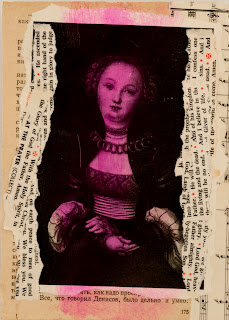Volume III, Part Two, Chapter XXVI. Prince Andrei and Pierre are talking. I used some text here from a short story entitled "Captain Courageous". That certainly describes Prince Andrei. He says, "But what is war, what is needed for success in military affairs, what are the morals of military society? The aim of war is killing, the instruments of war are espionage, treason and the encouragement of it, the ruin of the inhabitants, robbing them or stealing to supply the army; deception and lying are called military stratagems; the morals of the military estate are absence of freedom, that is discipline, idleness, ignorance, cruelty, depravity, and drunkenness." He failed to mention rape, one of the most atrocious and utilized weapons of mass destruction. -- Lola
Lola Baltzell
from page 217-218, volume 2 of original text
collage, ink
made 4/22/11
Pevear/Volokhonsky translation page 775-777
Lola Baltzell
from page 217-218, volume 2 of original text
collage, ink
made 4/22/11
Pevear/Volokhonsky translation page 775-777






























